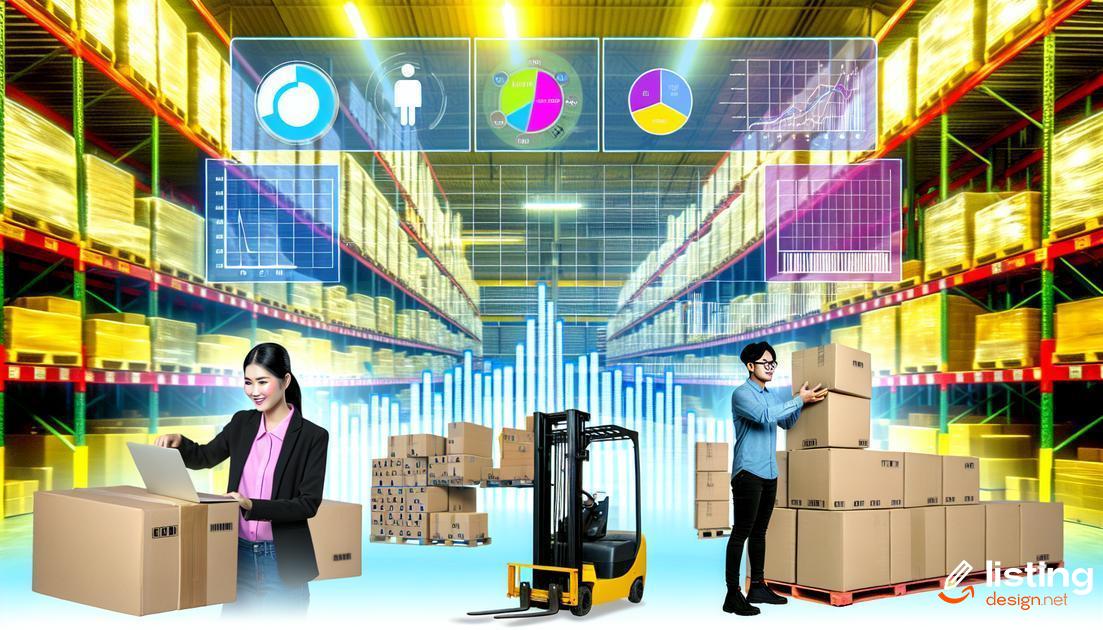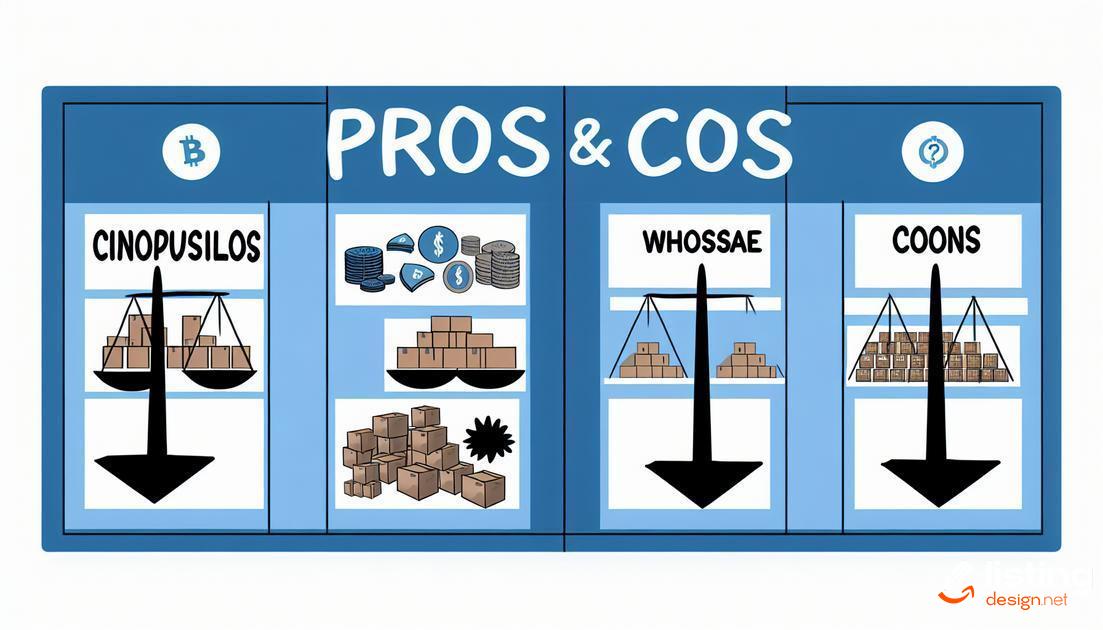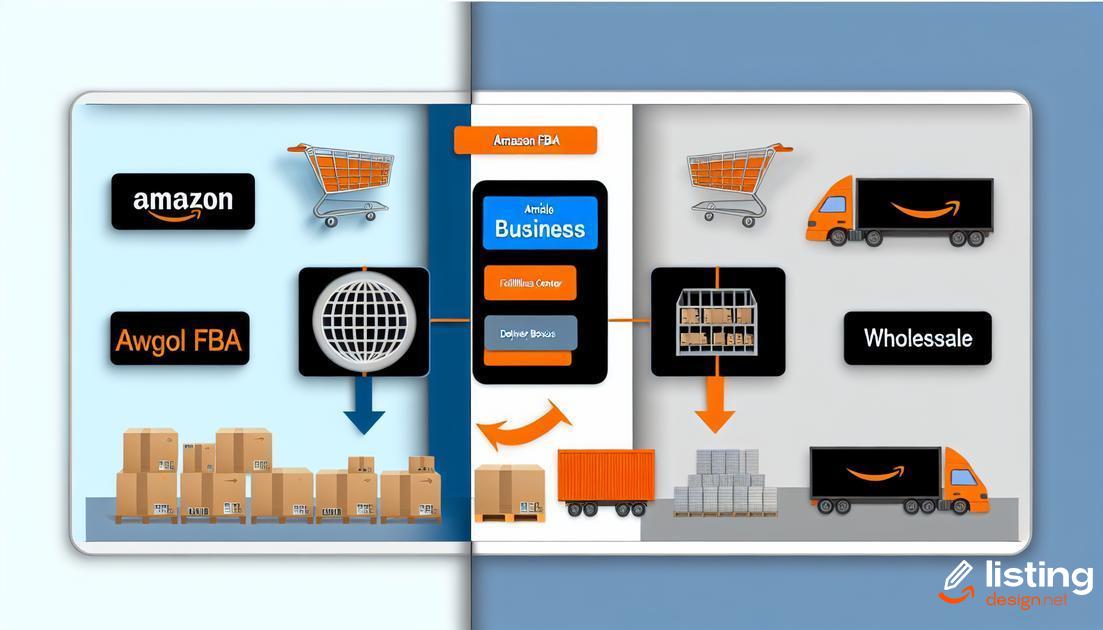Comparing Amazon FBA and wholesale can be daunting for new sellers. Both models have unique advantages and drawbacks that cater to different business needs. In this post, we will delve into the specifics of each, highlight the pros and cons, and help you decide which model aligns best with your goals.
Table of Contents
Understanding Amazon FBA
Amazon FBA, or Fulfillment by Amazon, is a service that allows businesses to outsource order fulfillment to Amazon. It means that sellers send their products to Amazon’s fulfillment centers, where items are stored until sold. When a customer places an order, Amazon handles the picking, packing, and shipping of the product.
Inventory Management: Amazon FBA offers comprehensive inventory management solutions. Sellers can view their inventory levels and get real-time notifications on stock status.
Shipping and Handling: By leveraging Amazon’s vast distribution network, sellers can ensure fast and reliable shipping. Amazon handles all the logistics, making same-day or two-day shipping possible for many products.
Customer Service: Amazon takes care of customer service and returns on behalf of the seller. This includes handling inquiries, processing returns, and managing refunds, which can save sellers significant time and resources.
Fees and Costs
One important consideration for sellers is the cost associated with Amazon FBA. Fees include storage fees, fulfillment fees, and additional services like labeling and repackaging. While these services provide value, it’s crucial to factor them into the overall business model to ensure profitability.
Scalability:
Amazon FBA allows businesses to scale quickly. Sellers can leverage Amazon’s infrastructure to handle an increase in orders seamlessly, which is particularly beneficial during peak seasons or promotional campaigns.
In summary, Amazon FBA provides a robust solution for businesses looking to streamline operations and leverage Amazon’s infrastructure, though it comes with associated costs that need to be considered.
Understanding Wholesale

Wholesale refers to the practice of purchasing goods in bulk directly from manufacturers or distributors at discounted prices and selling them to retailers or other businesses. This business model allows retailers to take advantage of economies of scale, reducing the per-unit cost of items, which can enhance their profitability.
One of the key aspects of wholesale is the importance of building strong relationships with suppliers. Reliable suppliers can offer consistent stock levels, exclusive products, and even better pricing structures, ensuring a steady supply chain for the business.
Another significant component of wholesale is inventory management. Effective inventory management tools and strategies are essential to avoid overstocking or shortages, which can impact cash flow and sales. Utilizing software to track inventory levels can help streamline operations and improve efficiency.
Additionally, wholesale businesses must have a solid understanding of market demand. This involves staying updated with industry trends, customer preferences, and seasonal fluctuations to make informed purchasing decisions that align with consumer demand.
When selling wholesale, it is also crucial to establish clear terms and conditions regarding orders, payment terms, and delivery schedules with the retailers. This minimizes potential disputes and builds long-term business relationships.
Overall, wholesale requires comprehensive planning, strategic supplier partnerships, and efficient inventory management to succeed in the competitive market. Businesses considering this model should weigh these factors to determine if it aligns with their operational capabilities and business goals.
Pros and Cons of Amazon FBA
Pros of Amazon FBA
- Effortless Logistics: With Amazon FBA, you save time and hassle as Amazon handles storage, packing, shipping, and returns.
- Prime Eligibility: Products listed under FBA are eligible for Amazon Prime, which can lead to higher sales and customer trust.
- Customer Service Management: Amazon takes care of all customer service inquiries and issues, allowing you to focus on growing your business.
- Scalability: Easily scale your business without worrying about storage space and shipping logistics.
Cons of Amazon FBA
- Costs: Fees can accumulate, including storage fees, shipping fees, and removal fees, which might reduce your profit margins.
- Less Control: You have limited control over the packaging and shipping process, which can affect your brand perception.
- Inventory Management: Managing inventory can be more challenging, especially with long-term storage fees affecting your bottom line if products do not sell quickly.
- Competition: Selling on Amazon comes with high competition and the risk of competing directly with Amazon’s own products.
Pros and Cons of Wholesale

Advantages of Wholesale
- Bulk Purchasing Power: Buying in large quantities often means lower prices per unit, which can lead to higher profit margins.
- Established Supplier Relationships: Building long-term relationships with suppliers can result in better deals and more reliable inventory.
- Variety of Products: Wholesalers often offer a broad range of products, enabling sellers to diversify their product lines.
- Control Over Inventory: Direct access to inventory allows for better management and quicker response to market demands.
Disadvantages of Wholesale
- High Initial Investment: Buying in bulk requires a significant upfront capital, which can be risky for new sellers.
- Storage and Logistics: Managing large quantities of stock demands ample storage space and complex logistics management.
- Potential for Overstock: Misjudging demand can lead to excess inventory, tying up capital and storage space.
- Longer Time to Market: Sourcing, ordering, and receiving products from wholesalers can be a time-consuming process.
Cost Comparison
Comparing costs between Amazon FBA and wholesale involves multiple factors. When utilizing Amazon FBA (Fulfillment by Amazon), the costs primarily include storage fees, fulfillment fees, shipping fees, and any additional services Amazon provides. These costs are commonly variable and can fluctuate based on the size of your inventory, the weight of items, and the time they remain in storage. Furthermore, FBA sellers also pay referral fees which are a percentage of each sale.
On the other hand, wholesale involves purchasing products in large quantities directly from manufacturers or distributors at lower unit prices. The significant costs here include the initial investment in inventory, warehousing fees if you’re storing items yourself, and logistics costs for shipping items to customers or to third-party fulfillment centers. Wholesale sellers may also incur costs related to managing their own online store or selling through various platforms, which can include subscription fees, transaction fees, and marketing expenses.
Inventory costs differ substantially between the two models. With FBA, sellers often need to maintain smaller inventory levels due to Amazon’s fast turnaround and multi-channel fulfillment options. In contrast, wholesale businesses may need more significant upfront investment in stock, which requires careful management to minimize overstock and deadstock scenarios.
Comparing these cost factors, Amazon FBA offers a more managed and service-oriented approach, which can be advantageous for sellers looking to minimize logistics management but may include higher variable costs. Wholesale typically offers lower per-unit costs and greater control but at the expense of higher initial capital requirements and potentially higher ongoing logistics and storage costs.
Time and Effort Required

The time and effort required to manage Amazon FBA and wholesale models can vary significantly. When using Amazon FBA, management tasks include: product sourcing, listing creation, and ongoing inventory management which are handled by Amazon.
This often reduces the daily involvement needed on the part of the seller, allowing for more efficient scalability. However, it also necessitates initial setup and periodic checks to ensure that inventory levels are optimal and that there are no listing issues.
Conversely, the wholesale model can be more labor-intensive in the beginning stages, requiring sellers to dedicate significant time towards sourcing suppliers, negotiating terms, and maintaining supplier relationships. Ongoing tasks involve order management, inventory tracking, and direct customer service.
Therefore, while Amazon FBA might offer less day-to-day involvement, it still requires initial effort to set up and maintain. The wholesale model, although potentially more time-consuming on a regular basis, might offer more control over the customer experience and direct supplier interactions.
Scalability
When assessing the potential for scalability in your e-commerce venture, it’s crucial to consider how each model allows for growth and expansion. Both Amazon FBA and wholesale have distinct approaches and advantages in this area.
Amazon FBA offers remarkable scalability since Amazon’s vast logistics network handles storage, packing, shipping, and customer service. This means that as your sales volume grows, Amazon scales its support to match your needs, enabling you to focus on sourcing and marketing your products without getting bogged down by logistical headaches.
However, with great scalability comes certain compromises. The more you rely on Amazon’s infrastructure, the more you become dependent on their systems and policies. This can limit your flexibility in certain operational aspects but provides unmatched ease when scaling up operations quickly and efficiently.
Wholesale
, on the other hand, requires a different approach. Scalability in wholesale is typically driven by your capacity to handle large-volume purchases and maintain good relationships with suppliers. As your business grows, you might need to invest in additional storage solutions and expand your distribution and logistics pipeline.
While scaling a wholesale business could potentially offer more control over your operations compared to Amazon FBA, it also demands significant investment in infrastructure and manpower. Additionally, you must ensure a consistent supply chain and manage bulk inventory, which can be financially taxing but offers more autonomy for a growing business.
In summary, both models present strong scalability potential but require different strategies and resources to manage effective growth. Consider your long-term business goals and capacity for investment when choosing the right model for your e-commerce venture.
Risk Factors

Amazon FBA can come with the risk of high storage costs if products do not sell quickly. Additionally, there’s the possibility of inventory damage or loss while it is being stored in Amazon’s warehouses. Market competition is also fierce, increasing the likelihood of having to lower prices or adjust strategies frequently.
Wholesale also carries its own risks. One significant risk is tying up substantial capital in large quantities of inventory, which may not sell quickly, leading to potential cash flow issues. There is also the challenge of finding reliable suppliers and the risk of receiving subpar goods when ordering in bulk. Furthermore, market demand fluctuations can significantly impact potential profits.
Whether opting for Amazon FBA or Wholesale, it is crucial to periodically assess the marketplace, review supplier reliability, and adapt business strategies to mitigate these risks.
Profit Margins
Customer Service and Return Management

When assessing Customer Service and Return Management in the context of Amazon FBA, it is important to note that Amazon handles these aspects on behalf of sellers. This can significantly reduce the operational burden, as Amazon’s customer service team manages inquiries, complaints, and returns. As a result, sellers can benefit from Amazon’s established reputation for efficient customer service and streamlined return processes.
In contrast, with Wholesale, you, as the retailer, are directly responsible for managing customer service and return requests. This demands a robust system in place to handle customer inquiries, returns, and complaints efficiently. Your capacity to manage these processes effectively will directly impact customer satisfaction and brand loyalty. Additionally, setting up and maintaining an efficient customer service team may require substantial time and resources, particularly as the business scales.
Overall, the approach to customer service and return management varies greatly between Amazon FBA and Wholesale business models. While Amazon FBA offers automation and convenience, Wholesale requires a more hands-on approach to ensure a positive customer experience.
Which Model Is Best for Beginners?
If you are new to selling products online, determining the right model to start with can be challenging. However, certain factors can make one approach more suitable than the other for beginners.
Simplicity: Amazon FBA offers a simplified process for beginners. With Amazon FBA, Amazon handles storage, shipping, and customer service, allowing you to focus on product selection and marketing.
Risk and Investment: Beginning with wholesale might require a larger upfront investment and involves managing inventory and logistics yourself. This can be overwhelming for someone new to online selling.
Support: Friendly seller support and resources available through Amazon FBA can be immensely beneficial for beginners who may need extra guidance.
Learning Curve: While both models have a learning curve, Amazon FBA’s straightforward process diminishes complexities, making it easier for newcomers. In contrast, wholesale requires understanding supplier negotiations, bulk purchasing, and inventory management, which can be daunting for someone just starting out.
Flexibility: For those who prefer more control over their business operations, wholesale might eventually be a better fit. However, starting with Amazon FBA allows you to dive into the world of e-commerce with less hassle and risk.
Final Thoughts

As we’ve explored the distinct aspects of Amazon FBA and Wholesale, it’s clear that each model offers unique advantages and challenges. Choosing between them depends heavily on your business goals, resources, and risk tolerance.
Amazon FBA is ideal for those seeking a largely automated process, with fulfillment and customer service managed by Amazon. It allows for significant scalability but comes with higher fees and stricter guidelines.
Wholesale, on the other hand, offers greater control over your operations and potentially higher profit margins. However, it requires significant time investment and solid supplier relationships to thrive.
Consider your available time and effort, initial investment, and desired level of involvement carefully when making your decision. Matching your business model to your personal capabilities and market strategies will guide you toward the most profitable and sustainable path.


